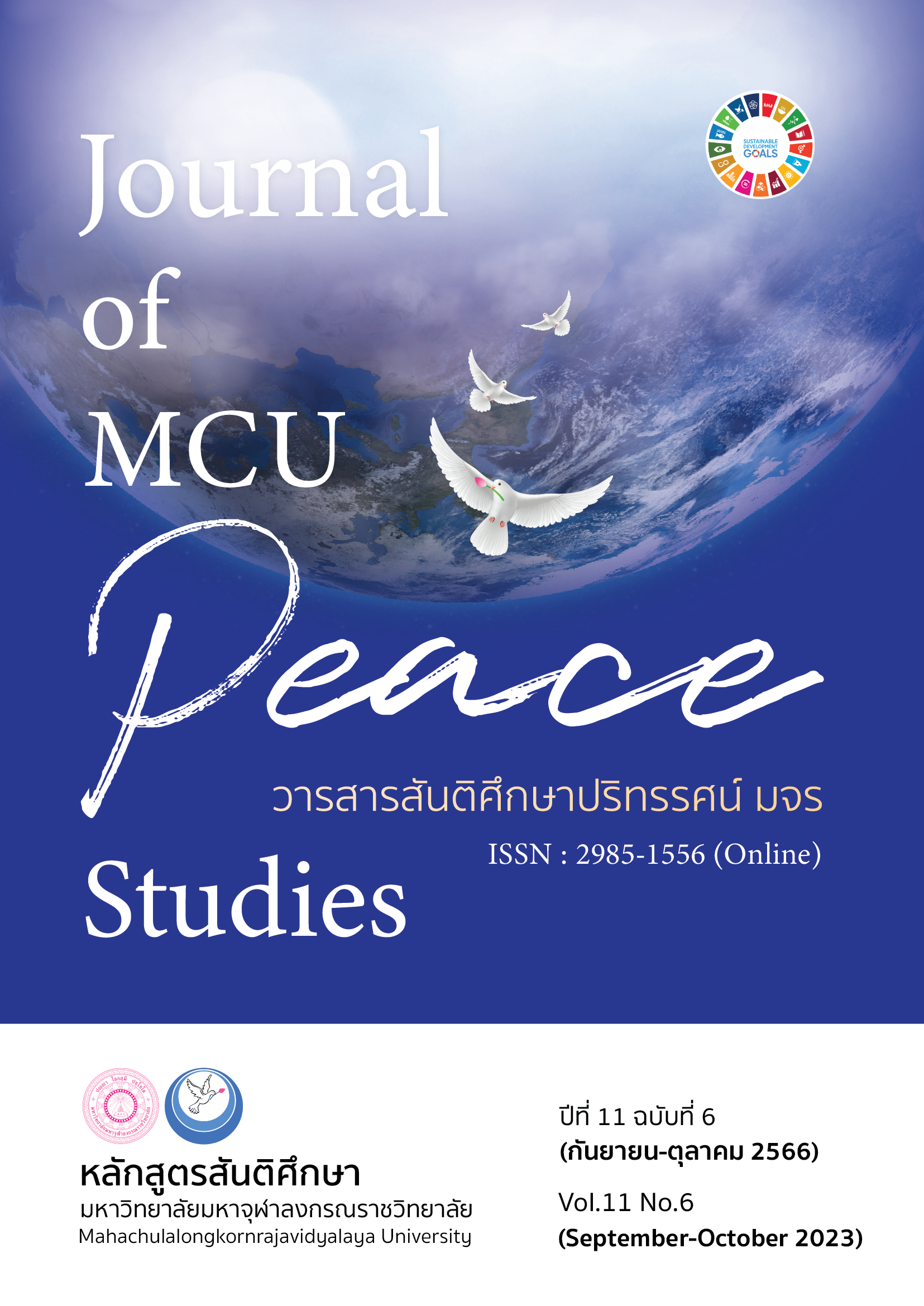แนวทางให้คำปรึกษาทางด้านอาชีพกับนักเรียนในระดับมัธยมศึกษา
Main Article Content
บทคัดย่อ
การให้คำปรึกษาทางด้านอาชีพที่มีประสิทธิภาพควรคำนึงถึงอาชีพที่เหมาะสมและสุขภาวะของผู้เรียนในปัจจุบัน ซึ่งการให้คำปรึกษาทางด้านอาชีพแบบคุณลักษณะและองค์ประกอบและความเหมาะสมระหว่างบุคคลกับสภาพแวดล้อม เป็นกระบวนการที่สามารถเลือกอาชีพที่เหมาะสมกับผู้เรียนได้ นอกจากนั้น ยังประเมินถึงสุขภาวะของผู้เรียน กระบวนการให้คำปรึกษาทางด้านอาชีพแบบคุณลักษณะและองค์ประกอบประกอบไปด้วย 7 ขั้นดังนี้ 1) สัมภาษณ์เบื้องต้น เพื่อสร้างสัมพันธภาพ และการรวบรวมข้อมูลพื้นฐาน 2) ระบุตัวแปรด้านพัฒนาการ เพื่อระบุการรับรู้ปัจจัยภายในและปัจจัยภายนอกของผู้เรียน 3) การประเมินเพื่อประเมินความสามารถ ค่านิยม และความสนใจของผู้เรียน 4) ระบุหาแนวทางในการแก้ไขปัญหา เพื่อวิเคราะห์ข้อมูลจากทั้งสามขั้นก่อนหน้านี้ 5) สร้างสรรค์และวิเคราะห์ความเหมาะสมระหว่างบุคคลกับสภาพแวดล้อม เพื่อทำนายทิศทาง ความพึงพอใจและความต้องการที่ชัดเจนของผู้เรียน 6) ยืนยัน สำรวจ และตัดสินใจ เพื่อตรวจสอบผลการวิเคราะห์ผลลัพธ์ทั้งหมด และ 7) ติดตามผล เพื่อติดตามความก้าวหน้าของกระบวนการให้คำปรึกษา โดยผู้ให้คำปรึกษาสามารถประยุกต์ใช้เทคโนโลยี และพัฒนาทักษะยืดหยุ่นให้กับผู้เรียน เพื่อสามารถปรับตัวต่อสภาพแวดล้อมที่แตกต่างกันออกไป
Article Details

อนุญาตภายใต้เงื่อนไข Creative Commons Attribution-NonCommercial-NoDerivatives 4.0 International License.
ทัศนะและความคิดเห็นที่ปรากฏในบทความในวารสาร ถือเป็นความรับผิดชอบของผู้เขียนบทความนั้น และไม่ถือเป็นทัศนะและความรับผิดชอบของกองบรรณาธิการ ยินยอมว่าบทความเป็นลิขสิทธิ์ของวารสาร
เอกสารอ้างอิง
Abbasi, S., Ayoob, T., Malik, A., & Memon, S. I. (2020). Perceptions of Students Regarding E-learning During Covid-19 at a Private Medical College. Retrieved July 5, 2022, from https://doi.org/10.12669/pjms.36.COVID19-S4.2766
AdmissionPremium. (2018). More than 60% of High School Students Nationwide Who Are about to Enter the University Fence. I Do Not Know What to Study. Retrieved June 20, 2022, from https://www.admissionpremium.com/content/3296
Bellanca, J., & Ronald, S. (2010). 21st Century Skills: Rethinking How Students Learn. Indiana: Solution Tree.
Boonsathirakul, J. (2021a). Life Career Development. Bangkok: Faculty of Education, Kasetsart University.
Boonsathirakul, J. (2021b). Crisis and Stress Coping of Senior High School Students. Academic Journal of Education, 22(2), 204-219.
Boonsathirakul, J. (2021c). Career Preparation for Students in the 21st Century. Kasetsart Educational Review, 36(2), 1-11.
Chang, C. (1998). Disposition Optimism and Primary and Secondary Appraisal of a Stressor: Controlling for Confounding Influences and Relation to Coping and Psychological and Physical Adjustment. Journal of Personality and Social Psychology, 74(1), 1109-1120.
Crites, J. (1974). Major Contribution Career Counseling: A Review of Major Approaches. The Counseling Psychologist, 4(3), 3-32.
Dawis, V. (1996). The Theory of Work Adjustment and Person-Environment Correspondence Counseling. California: Jossey-Bass.
Del Valle, J., Werner, C., & Rodriguez, D. (2002). Adolescent Career Development: Classroom, Group, and Individual Guidance Activities. California: Books/Cole.
Denning, S. (2016). Christensen Update Disruption Theory. Strategy & Leadership, 44(2), 10-16.
Frydenbery, E. (1997). Interrelationships between Coping, School Connectedness and Wellbeing. Australian Journal of Education, 53(3), 261-276.
Gottfredson, L. S. (1981). Circumscription and Compromise: A Developmental Theory of Occupational Aspirations. Journal of Counseling Psychology, 28(6), 545–579.
International Federation of Robotics. (2017). Executive Summary World Robotics 2017 Industrial Robots, Working Paper of International Federation of Robotics. Retrieved June 28, 2022, from https://ifr.org/downloads/press/Executive_Summary_WR_2017_Industrial_Robots.pdf
Koomsiri , P., Jankaew , S., & Kongpon . T. (2020). A Case Study of Determinants of Using Mental Health Helpline 1323 in Crisis and Effective Practice of the Counselor. Journal of Mental Health of Thailand, 28(2), 99-110.
Orgiles, M. et al. (2021). Coping Behaviors and Psychological Disturbances in Youth Affected by the COVID-19 Health Crisis, Frontiers in Psychology. Retrieved July 7, 2022, from https://doi.org/10.3389/fpsyg.2021.565657
Payne, K. (2017). The Broken Ladder: How Inequality Affects the Way We Think, Live, and Die. New York: Viking.
Ringwald, A. (2015). 3 Ways to Fix Our Broken Training System. Retrieved July 1, 2022, from https://www.weforum.org/agenda/2015/01/three-ways-to-fix-our-broken-training-system
Rounds, B., & Tracey, J. (1990). From Trait and Factor to Person-environment Fit Counseling: Theory and process. New Jersey: Erlbaum.
Rudolph, C., Lavigne, K., & Zacher, H. (2016). Career Adaptability: A Meta-analysis of Relationships with Measures of Adaptivity, Adapting Responses, and Adaptation Results. Journal of Vocational Behavior, 98(1), 1-49.
Savickas, L., & Porfeli, J. (2012). Career Adapt-abilities Scale: Construction, Reliability, and Measurement Equivalence Across 13 Countries. Journal of Vocational Behavior, 80(3), 661-673.
Schiersmann, C., Ertelt, B. J., Katsarov, J., Mulvey, R., Reid, H., & Weber, P. (2012). Nice Handbook for the Academic Training of Career Guidance and Counselling Professionals. Heidelberg: Heidelberg University.
Schulte-Körne, G. (2016). Mental Health Problems in a School Setting in Children and Adolescents. Dtsch Arztebl Int, 113(11), 183–190.
Schwab, K. (2016). The Fourth Industrial Revolution: What it Means, How to Respond. Retrieved June 30, 2022, from https://www.weforum.org/agenda/2016/01/the-fourth-industrial-revolution-what-it-means-and-how-to-respond
Schwartz, K. et al. (2021). COVID-19 and Student Well-Being: Stress and Mental Health During Return-to-School. Canadian Journal of School Psychology, 36(2), 166-185.
Sunarto, D. (2015). Improving Students Soft Skills Using Thinking Process Profile Based on Personality Types. International Journal of Evaluation and Research in Education, 4(3), 118-129.
Swanson, L. (1992). Vocational Behavior: Life-span Career Development and Reciprocal Interaction of Work and Nonwork. Journal of Vocational Behavior, 41(1), 101-161.
Szczepura, A., Nomura, T., & Wild, D. (2020). The Future of Robots in a Super-aged Society. Annals of Robotics and Automation, 4(1), 18-21.
Walsh, B. (1990). A Summary and Integration of Career Counseling Approaches. New Jersey: Erlbaum.
Wongpiromsarn, Y. (2020). Mental Health and the COVID-19 Crisis in Thailand. Journal of Mental Health of Thailand, 28(4), 280-291.
World Economic Forum. (2020). The Future of Jobs Report 2020. Retrieved June 23, 2022, from http://www3.weforum.org/docs/WEF_Future_of_Jobs_2020.pdf


